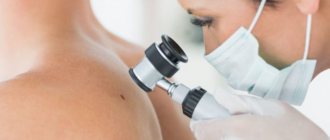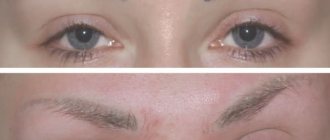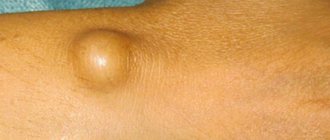From this article you will learn:
- When is laser removal of papillomas necessary?
- What are the advantages of the laser method for removing papillomas?
- How is the procedure for removing papillomas using a laser performed?
- What are the consequences of laser removal of papillomas and how to cope with them
- What is better than laser removal of papillomas?
Papillomas, moles, warts and other benign formations appear on the body and face at any age. Their presence confuses a person and causes significant inconvenience. Although they are harmless to health, since they are located on the skin, they look extremely unaesthetic. In addition, in most cases they can be located in inconvenient places, where they can easily be touched and injured, and therefore cause pain and discomfort. Laser removal of papillomas is today considered one of the most effective ways to get rid of skin tumors.
When is laser removal of papillomas necessary?
Papillomas
- These are neoplasms that appear due to a viral infection. Most often it affects people with weak immune systems. This virus is called papillomavirus. The main areas it affects are the skin and mucous membranes.
A person may not even suspect that the papillomavirus has settled in his body. New growths do not appear on the skin immediately. The virus can spread for quite a long time without any symptoms, and then appear on the body in the form of papillomas. They come in different sizes (from a millimeter to several centimeters) and shades (from flesh to dark brown). They are easy to recognize: imagine a wart on a stalk.
Papillomas are often found
on the face around the eyelids and inside the nose, on the neck, in the ears, armpits, in the genital area (on the labia and cervix), in the larynx and oral cavity.
Human papillomavirus
(HPV) can be dangerous.
If it spreads to human genitals, there is a possibility of it degenerating into malignant tumors. Like any virus, HPV enters the body from the outside. This happens during sexual intercourse
. It is introduced into the body through epithelial basal cells, in which its active reproduction occurs.
It can also be transmitted through household means.
This happens less often, but still such a possibility cannot be excluded. Infection can be acquired in a swimming pool or public bath, or when using other people's household items and personal hygiene items. When kissing, HPV is transmitted through the lips and begins to parasitize the oral mucosa.
During childbirth or pregnancy from mother to child
vertical mode of infection occurs.
There is evidence of infection of medical personnel who operated on tumors through surgery. This means that the virus can spread through airborne droplets.
Prerequisites for the manifestation of symptoms are:
- Weakening of the immune system as a result of an infectious disease;
- Smoking;
- Alcoholism;
- The presence of urogenital infections (mycoplasmosis, herpes simplex, ureaplasmosis, chlamydia);
- Stress;
- Long-term use of contraceptives;
- Lack of vitamins (particularly vitamin A).
The risk of acquiring HPV through sexual contact is extremely high. Because more than half of people who have reached puberty are carriers of this type of virus.
Let's look at some reasons for laser removal of papillomas
:
- Aesthetic discomfort;
- Functional disorders of the organ on which the papilloma has formed (the neoplasm can grow into surrounding tissues);
- The risk of papilloma degenerating into a malignant tumor.
There are 130 different types of papillomas. Ten of them are capable of developing into a malignant form. This happens mainly when papillomas are exposed to external processes. Constant rubbing with clothes, scratching, and touching the tumor during depilation lead to damage, which subsequently causes their transformation into malignant forms.
Recommended articles on the topic:
- Painless lip modeling: techniques and recommendations
- Beauty injections: types, preparations, reviews
- Eyelash restoration at home and in a beauty salon
There are two types of indications
to laser removal of warts and papillomas:
aesthetic and medical.
The aesthetic reason is the desire to eliminate external defects when papilloma is localized in open areas of the body.
Medical indications
for laser removal of papillomas:
- Frequent tumor damage;
- Unpleasant sensations, pain, itching, burning in the areas of growth;
- Changes in the color, size, shape of the tumor;
- Increased number of papillomas;
- Threat of malignant degeneration (determined by appropriate tests).
How to care for your skin after papilloma removal
Recovery after the procedure is quick and, as a rule, without complications.
During the day, you should not wet the crusts that have formed at the site of the papilloma. Therefore, you should avoid washing your face. The doctor will prescribe special solutions to treat the damaged area and tell you how often and for how many days this should be done. You should also not go to the sauna or gym for one week after surgery. Is there a risk of a new papilloma forming in the same place, despite proper care? Alas, yes. “This is due to the presence of the human papillomavirus in the body,” explains Maria Istomina. “If it is there, then there is a possibility of new formation of papillomas, because by burning out a papilloma, the doctor does not destroy the virus as a whole, but removes only one of its manifestations.”
Published on the portal jv.ru
Types of growths for which the laser method of removing papillomas is used
Let's look at the main types of papillomas.
- Simple
- hard nodules covered by keratinized skin. They can appear close to each other and merge into one large formation.
- Flat
- look like moles.
- Thread-like –
bump-like growths resembling a mole. Subsequently, they spread and turn into papillary-like formations up to 6 mm in size. Appear on the skin in the eye area, neck, armpits.
- Plantar –
cones with a smooth surface, surrounded by a rim.
- Genital
warts
are growths that appear on the mucous membranes of the genital organs. This species is spread through sexual contact. - Epithelial
hyperplasia
is a small growth that affects the lips and mouth. They can merge with each other. - Juvenile
laryngeal
papillomas - they are found in the larynx of newborn children. Infection occurs from the mother when passing through the birth canal.
Read material on the topic: Lightening age spots
Traditional medicine recipes
At home, you can use effective folk remedies to get rid of pathology. There are several recipes that are safe and can be used for men, the elderly, children and pregnant women:
| Means | Method of preparation and use | |
| Onion |
The duration of therapeutic effect is 10-14 days. The product is used to eliminate different types of growths on the body, excluding the area of the face, genitals and anus. Not for use in patients with intolerance to the product, newborns | |
| Garlic |
Use with caution in patients prone to allergic reactions | |
| Potato juice |
The duration of use of the prescription is 14 days. This product can even be used to eliminate growths in newborns, small children and pregnant women. | |
| Castor oil |
The duration of therapeutic effect is 4-5 weeks. A safe medicine for getting rid of hanging, dry, white growths, squamous cell papillomas | |
| Egg white |
Suitable for eliminating any type of papillomas, including the intimate areas and face. Safe for newborns, pregnant women | |
Such recipes will become an alternative to pharmaceutical drugs if it is impossible to use them. In rare cases, they cause allergic reactions. The disadvantage of such recipes will be the duration of use to achieve a positive result.
Other effective remedies
Folk remedies based on medicinal herbs and other natural ingredients will help eliminate pathological formations in men and women.
Such products cannot be used for newborns and children under 14 years of age, patients with an allergic reaction or a tendency to it.
Celandine
The medicinal plant helps get rid of hanging, dry, white, squamous growths, pedunculated papillomas in the arms, neck, legs, abdomen, and armpits. Mode of application:
- Cut a few bushes of the plant.
- Wash and chop.
- Using gauze, squeeze out the juice.
- Use the resulting product to treat the affected areas 2 times a day.
The duration of celandine therapy depends on the number of tumors and their size. Usually 10-14 days are enough to completely eliminate the growths. It is strictly contraindicated to use the medicine to remove papillomas in the genital area, anus, intraductal growths of the mammary glands in women, internal formations on the mucous membranes of the genital organs.
Rowan and wormwood
Fresh rowan berries and freshly picked wormwood are used to eliminate various growths on any part of the body, excluding the intimate areas, eyelids, and face. Mode of application:
- Grind the berries and herbs separately.
- Squeeze out the juice using gauze.
- Use juices alternately to lubricate growths 4-5 times a day.
Duration of use: at least 2 weeks. If necessary, it is allowed to extend the course to 3-4 weeks. The only contraindication will be individual intolerance to the components of the medicine.
Dandelion cologne
The healing flowers of the plant help eliminate pedunculated papillomas, hanging, dry and white growths in the armpits, neck, arms, legs, abdomen, shoulders, and back. Recipe:
- Grind the fresh flowers of the plant.
- Loosely fill a 500 ml glass container.
- Fill to the top with regular cologne, which can be purchased at a store or pharmacy.
- Leave to infuse for 10 days.
Use the filtered medicine to lubricate the growths three times a day for 2 weeks. The composition should not be used to remove growths on the mucous membranes of the nasopharynx and genitals.
Dandelion tincture
The composition is applied and prepared in the same way as the previous product, but high-quality alcohol or vodka is used as a filling. The infusion time is also 2 weeks.
The medicine is used to remove growths of various types throughout the body, excluding the mucous membranes of the genitals, nasopharynx and anus.
Nut ointment on kerosene
Unripe walnuts infused with kerosene are used as an effective remedy for eliminating formations in the arms, legs, neck, armpits, and abdomen. Recipe:
- Peel 10 unripe fruits.
- Grind the resulting kernels using a meat grinder.
- Place in a glass container and add kerosene so that the liquid completely covers the fruit.
- Leave to infuse for 21 days.
Use the filtered medicine every evening, moistening a napkin and applying it to the area of the growth for 30 minutes. After 5 days, the growths will decrease in size and will disappear in a week. The product is not used for the treatment of intraductal papillomas, formations in the anus, genitals, face, eyes.
Some traditional healers suggest burning papillomas with pure kerosene, but the method is extremely dangerous and is not recommended for use.
Herbal collections
A healing herbal mixture is used to relieve symptoms that appear in the presence of intraductal growths of the mammary glands, internal formations on the cervix, in the vagina, nose, on the tongue and under the tongue. Recipe:
- Take equal amounts of immortelle, birch buds, calendula, St. John's wort, sage, and thyme.
- Separate a tablespoon of the pre-chopped mixture.
- Add to a glass of water, cook for 3 minutes.
- Take the filtered medicine, divided into 2 parts, daily.
The course of therapeutic effects is 4 weeks. The composition has anti-inflammatory, antiseptic properties and helps stop the appearance of new growths.
Another herbal recipe also helps to cope with the striking clinical manifestations of intraductal growths, formations in the nose, under and on the tongue, in the vagina, on the cervix and other internal organs:
- Take wormwood, chamomile, plantain, and St. John's wort in equal parts.
- Separate 2 tablespoons and add a glass of boiling water.
- Leave to infuse for 30 minutes.
- Divide the finished medicine into 3 parts and drink throughout the day.
Continue therapy for at least 3 weeks. The method helps men especially well with the appearance of genital warts in the genital area and anus.
Baths with chestnut infusion
Baths help relieve symptoms when papillomas appear in the anus, genitals and any other part of the body. They have anti-inflammatory and antiseptic effects, stopping the growth of tumors. Recipe:
- Collect chestnut leaves and chop thoroughly.
- Separate 100 g and cook in a liter of water for 15 minutes.
- Leave to infuse for 8 hours.
Pour the filtered product into warm water and take a bath for at least 20 minutes. The frequency of home sessions is once every 2 days, the course is 10-15 procedures.
Laundry soap
Regular soap is used as compresses on the area where the growth appears. It is allowed to remove hanging, dry and squamous growths, and pedunculated papillomas in this way. Mode of application:
- Grate the bar of soap and add 200 ml of water.
- Cook until a liquid homogeneous consistency is formed.
- Apply the resulting mass hot to the papilloma and cover with a cloth on top.
- The compress lasts 30 minutes.
It is allowed to use the method for no more than 7 days in a row. Treatment of growths in the genital area, anus, and face is contraindicated.
Vinegar
Regular table vinegar is used to eliminate various types of single papillomas on any part of the body. It should be dripped onto the growth every evening until it falls off.
A similar recipe cannot be used for the treatment of genital warts in the genital area and anus.
Absolute contraindications to the use of pharmaceutical and traditional methods will be chronic pathologies of the skin, rapidly growing growths, severe pain in the area of formation, bleeding during injury, and the inability to stop bleeding by conventional means.
Laser removal of papillomas and other methods of elimination
It is recommended to begin treatment for HPV immediately after an accurate diagnosis and consultation with a doctor. It is necessary to fight the virus in full. An integrated approach includes the selection of the correct therapy to eradicate the causes of the disease and laser or any other removal of papillomas from the human body.
There are several variations of methods for eliminating growths. All of them are painless, safe and will not leave scars.
Medical removal of papillomas (cauterization)
This is removal with the help of drugs -
such as natural compounds feresol or verrucacid containing phenol and metacresol. These drugs are used to cauterize papilloma. This procedure must be performed with extreme precision and caution. You can't do it yourself. Carelessness and lack of experience often lead to burns.
Laser removal of papillomas
Laser removal of papillomas and condylomas involves a burning process using a carbon dioxide laser beam
. The laser hits exactly the right place and does not damage the surrounding skin. As a result of removal, a microscopic wound is left that heals in three to four weeks. The skin heals itself, so additional restorative procedures are not necessary. Scars will not appear. Laser removal of warts and papillomas is not recommended if there are wounds or any inflammation on the skin, herpes or other infection. This procedure is also not performed during pregnancy. Laser removal of papillomas located on the face, eyelids, and armpits is carried out if both single and multiple neoplasms are detected.
Removal of papillomas with liquid nitrogen (cryodestruction)
The method involves short-term exposure of the papilloma to very low temperatures.
. The damaged area of skin is treated with liquid nitrogen, after which it loses sensitivity and becomes white. Freezing occurs immediately, as a result of which the papilloma is destroyed. Tissue healing may take five to six weeks. There will be no scars left. This procedure has a number of advantages. It is well tolerated by humans, painless and does not require pain relief.
Radio wave removal of papillomas
Radio wave removal is the optimal solution for skin problems. It occurs using the Surgitron device. The neoplasm is destroyed due to energy that heats the papilloma from the inside without damaging surrounding tissues
. The electrode, which is the main working part of the device, heats up, and the papilloma is immediately “cut off” with one movement. In this case, there is no loss of blood due to the fact that the tissues are cauterized and remain unharmed, and the vessels are “sealed”. The procedure does not cause pain. After it, the wound heals quickly and no traces of papilloma removal remain.
Electrocoagulation
With electrocoagulation, the destruction of pathological tissue is achieved by exposing it to electric current.
using EHF devices. High temperature affects the papillomas, and they are destroyed. The advantage of this procedure is the ability to control the depth of exposure, as well as its low cost. But there are several disadvantages. Nearby tissues and skin areas may be subject to injury. Healing after this method occurs over a long period.
Surgical removal with a scalpel
Surgical removal is used in cases of removal of large tumors
. The operation is performed under local anesthesia. Since after removal, cosmetic stitches are applied to the skin for seven days, this method is used extremely rarely if the papillomas are on the face. But it is effective in the fight against malignant growths.
ethnoscience
Traditional medicine has always helped to get rid of any misfortune. To remove papillomas, the method of treating them with celandine juice
.
This plant has poisonous juice, therefore, in order not to damage neighboring areas, baby cream is applied to them. A drop of celandine juice is squeezed onto the neoplasm itself. The next option is an infusion of dandelions in alcohol
, which is applied to the area of the growth five times a day.
The infusion is prepared in the following way. The heads of dandelion flowers are placed in a glass jar and filled with ethyl alcohol. It should be kept in a dark room for two weeks. And then use it for treatment. It is difficult to say how safe and effective all of these methods are, so it is better not to tempt fate and consult a doctor
.
Read material on the topic: Dermatological facial cleansing: types, reviews and prices
Treatment with pharmaceuticals
Small formations that do not cause any discomfort other than aesthetic ones can be eliminated independently at home. There are several pharmaceutical drugs that help quickly and permanently remove papillomas without negative consequences.
Typically, external agents are used in the form of ointments and solutions, as well as medications for internal use that have a direct effect on the virus.
lapis pencil
A simple and effective remedy against growths on the arms, neck, shoulders, abdomen, legs and armpits. You can buy it at any pharmacy. It has antiseptic and anti-inflammatory properties due to the content of silver nitrate. It can only be used externally, so it does not treat internal papillomas. The lapis pencil is used to remove pedunculated, white, dry, hanging and squamous cell papillomas.
During treatment, you should follow all the rules described in the instructions and avoid contact of the product with healthy areas of the skin. The medicine is not used for the treatment of newborns and children under 7 years of age, pregnant women and patients with individual intolerance to its components.
Acyclovir ointment
Strong antiviral ointment. Thanks to the triphosphate content, it stops the development of tumors. Permitted for use to eliminate hanging growths, pedunculated papillomas, dry, white and squamous formations on any part of the body, excluding intimate areas and face.
The product is applied several times a day to the affected areas, and within 10 days the number of formations is significantly reduced. Most often used as part of complex therapy in combination with other antiviral and immunostimulating drugs.
Not for use in newborns and children under 3 years of age, pregnant women and patients with hypersensitivity to the main component of the drug.
Plasters
Special patches impregnated with medicinal substances help eliminate squamous cell papillomas, warts and calluses. Allowed for use by children from 3 years of age and adults. The most popular means of this form will be Salipod, Urgokol. Salicylic acid in their composition has a medicinal effect - it penetrates the growth and provokes its death.
To get results, you need to leave the patch on the formation for 7-14 days, changing it as it peels off or gets dirty. The product is not used for newborns, as well as patients with allergies to salicylic acid. It is contraindicated to use it on the face.
Verrucacid
The solution helps eliminate the growth in 1 day due to the content of phenols, which destroy its structure and stimulate rejection from healthy tissues. The medicine should be applied using a special applicator, avoiding contact with undamaged areas.
The product is quite aggressive and is not used during pregnancy, for newborns and children under 7 years of age, for patients with a tendency to allergic manifestations. It can be used to remove squamous, hanging, dry and white growths, and pedunculated papillomas.
Hydrogen peroxide
Hydrogen peroxide 3% is considered the safest pharmaceutical remedy for eliminating papillomas. Many doctors agree that it can be used to remove any growths on the body and mucous membranes. Due to its safety, it is used even for children over one year old and pregnant women.
The simplest way is to treat the affected areas with a pure solution 4-6 times daily. After 7 days, the growth will separate from healthy tissue, and after another week it will disappear. The only contraindication will be individual intolerance and the presence of internal growths.
Cycloferon
The drug is presented in the form of tablets, solution for injection and liniment for external use. Has an antiviral effect. It is recommended to combine taking tablets with the use of liniment. Indicated for growths of any type throughout the body.
Not prescribed for children under 3 years of age, women during pregnancy and lactation, and patients with allergies to the components of the drug.
Zinc and salicylic acid
The substances are actively used in the fight against hanging, dry, white, squamous growths, pedunculated papillomas in the arms, neck, shoulders, abdomen, legs, feet, fingers. Zinc acid is available in the form of an ointment for external use, while salicylic acid is available in the form of a solution and ointment.
The drugs are contraindicated during pregnancy, children under 3 years of age, patients with a tendency to allergic reactions, and in the presence of growths in the anus and genital area.
Groprinosin
The tablets have an antiviral and immunostimulating effect, suppress the development of HPV and the appearance of new growths. They are used as part of a complex treatment of a pathological condition, taken in long courses of 4-6 weeks.
The drug is not prescribed to newborns, pregnant women, children under 14 years of age, and patients with severe disorders of the heart, kidneys, or gout.
Stefalin
An ointment based on herbal components, used to remove various types of growths throughout the body, excluding the genital area, anus, and face.
Apply to problem areas 1-2 times a day until the formation disappears. It is not classified as a medicine, so doctors rarely prescribe this composition. The ointment is contraindicated for children under 7 years of age and people with allergies to any medicinal plants.
It is strictly contraindicated to use any pharmaceutical products without prior consultation with a specialist and diagnostic examination. You should not remove growths on your face, eyelids, or intimate places yourself. In newborns, papillomas are removed only in a medical institution.
Why is laser removal of papillomas so in demand?
Before the use of laser removal of papillomas in medicine, warts were cut off using electrical methods, the use of chemical reagents and low-temperature nitrogen. Laser removal of papillomas is an innovative technique that provides painless removal of the tumor.
Thanks to low intensity radiation, blood circulation in the body is stimulated and healing is accelerated. Along with removing the growth, the laser beam seals the blood vessels, eliminating the occurrence of inflammation and scars.
Laser removal of papillomas on the face is an extremely precise procedure
. There is disinfection of the wound and absolute control over the depth of penetration, in which the tissues around the affected area are not exposed.
Chemical destruction
It is carried out using special liquid preparations based on acid or creams containing alkali. Such drugs are sold in pharmacies as prescribed by a doctor.
This method can be used to remove only single vulgar papillomas (warts) on the hands.
However, the slightest inaccuracy in the use of chemotherapy can lead to burns of healthy tissue or incomplete removal of the tumor. The use of such products is painful, time-consuming, does not provide a guaranteed result and can lead to the formation of unsightly scars at the site of the tumor.
When using chemicals to combat tumors, special precision is required
Which laser device is used to remove papillomas?
The following types of lasers are used in dermatovenerology:
Lasers with constant radiation (conventional)
This type of laser is used to remove warts, papillomas, and genital warts. It has powerful, highly focused constant radiation, which quickly leads to the evaporation of pathological papilloma cells.
The main disadvantage is the scars left behind. Therefore, this type is not suitable for facial surgery. If the papilloma or wart was large, then the mark after removal will be rather large.
Pulsed lasers, or fractional lasers, or resurfacing lasers
They can be used to remove unwanted formations in the facial area, such as small papillomas, flat warts, senile keratomas and age spots, as well as for skin peeling.
The laser acts in a pulsed manner, so there is no burn on the skin. This device only removes the surface layer. After the procedure there are no traces or scars left.
Papillomas on the neck
We are accustomed to calling small nodules with a thin stalk on the neck warts, although in fact they are filiform papillomas. These formations are not life-threatening, but many people want to remove them.
Before removing a papilloma on the neck, you need to make sure that it is not a mole or other skin formation. Its characteristic features:
- The shape of a grain attached to the skin by thin threads, up to 2 mm long.
- Shade - from yellow to brown.
- They can be single (lower on the neck) or grouped up to ten pieces.
- In addition to the neck, papillomas appear on the face, eyelids, cheeks, and around the lips.
Papillomas on the neck appear due to a specific virus that penetrates in different ways - through contact with the skin, transfer to the fingertips.
In what cases should laser removal of papillomas not be used?
Contraindications
for laser removal of warts and papillomas are:
- Herpes in the acute stage;
- Diabetes;
- Pregnancy and lactation;
- Epilepsy;
- Immunodeficiency conditions;
- Malignant nature of neoplasms;
- Any diseases of the skin and blood;
- Tan obtained 2 weeks (or less) before the procedure.
Why you need to get rid of tumors
The content of the article
Moles, papillomas, polyps, warts and other neoplasms not only look unsightly, but also cause inconvenience - they become injured, bleed, become inflamed, hurt, grow and fester. Erosion of the cervix, which causes contact bleeding, heavy discharge and provokes inflammatory processes, is no less troublesome. But the most dangerous thing is the degeneration of these formations into cancer, so you need to get rid of pathological formations.
What are the advantages and disadvantages of the laser method for removing papillomas?
How does laser removal of papillomas work? First, the beam affects the tumor, resulting in the destruction of infected tissue. The place where the papilloma was located is covered with a crust to protect the healing process from the external environment. It will occur in a short period due to the disinfecting effect that the hardware technique has.
Some do not risk using the services of this procedure, not suspecting that the laser is used even in gynecology due to its accuracy and control of the effects. It is used to treat condylomas that have formed on the genitals.
From all of the above, we can conclude that the main advantages
Laser removal includes:
- No burnt tissue;
- Prevention of the inflammatory process;
- The ability to remove hundreds of small tumors (up to 1 cm in size) in one treatment session.
But there are also disadvantages.
When using a laser beam, side effects such as burns are possible.
The postoperative period passes quickly. During this time, redness may appear in the treated areas, followed by the formation of a scab. But this is a normal phenomenon after a laser procedure.
You should seek the help of doctors if swelling and hyperemia appear after laser removal of papillomas or warts. This can happen if the body has a tendency to allergic reactions to the sun.
Blisters may form on sensitive skin. After self-healing, their place is taken by barely noticeable whitish scars.
Read material on the topic: Removing moles on the face without pain and consequences
Cryodestruction
A long-established and well-proven method of removing tumors using exposure to extremely low temperatures, in which the affected area is exposed to liquid nitrogen or other refrigerant for a short time.
The application of the refrigerant itself does not require preliminary anesthesia, because The application is painless, although the patient may feel a slight tingling or burning sensation. However, after the operation, during the “unfreezing” of the tissues, acute pain occurs, which can last up to a day. This is normal.
After a few hours, redness and swelling form around the injury, and a day later a subcutaneous blister filled with fluid forms. The rehabilitation period lasts a week, during which the swelling and hyperemia disappear, and the bladder breaks on its own. After this, it is necessary to apply an antiseptic drug prescribed by a specialist.
The death of tissue under the scab continues for three weeks, which ensures reliable destruction of infected tissue. Wound healing occurs in 1.5 months, and the mark completely disappears in six months, during which it is necessary to protect the skin from the sun and mechanical stress.
The method is successfully used to remove papillomas on the body, in the oral cavity and for the treatment of the cervix. But to remove tumors on the face and intimate area, it is better to use another method. In the first case - due to swelling and hyperemia, in the second - due to increased pain sensitivity of the genital area.
What are the stages of laser removal of papillomas?
Preparations for the laser removal procedure for papillomas must be taken with full responsibility. You should not sunbathe or go to a solarium at least two weeks before surgery. It is also better not to use household chemicals, go on a hypoallergenic diet and lead a healthy lifestyle. All this will help the skin cope with the procedure and survive the recovery process.
If papillomas are detected anywhere in the body, you must contact a specialist to find out the cause of the infection. Immunodeficiency is quite often the first sign of the appearance of tumors on the skin. Treatment begins after a conversation with a dermatologist and cosmetologist.
Since papillomas cells consist of 75 percent water, the laser action is based on the evaporation of liquid and the destruction of pathological cells. The fabric is cut off layer by layer until the growth is completely removed. Healthy areas near the tumor are not affected and remain unharmed.
Laser removal lasts no more than five minutes and occurs in the outpatient room. Let us consider in order what stages are performed during the procedure.
Stage 1.
The doctor
treats the skin with an antiseptic
.
Stage 2.
The doctor
administers pain relief
by injecting the patient with a syringe or applying a cream containing an anesthetic such as novocaine or lidocaine to the skin.
Stage 3.
The
pain relief will take effect
in three to five minutes. We must wait for this time.
Stage 4.
Everyone in the room wears
safety glasses
to prevent the laser beam from burning the retina.
Stage 5.
The doctor takes a laser and
treats the papilloma
around the entire perimeter. The burn remaining after removal is treated with fucorcin or any other antiseptic. It is better to apply a dry gauze pad and a bandage.
During the entire procedure, the patient has no pain at all
. The recovery period for healing of the skin or mucous membrane takes from six to eight days.
Electrocoagulation
With any method of removing papillomas, there is a certain rehabilitation period.
It is used to remove small papillomas. Since the essence of the method is the thermal destruction of the affected tissue, the method is popularly called “cauterization.” A heated electrode is used to touch the neoplasm and coagulate it along with the vessels, resulting in a pinpoint burn that becomes covered with a dark crust within an hour. In the case of single papillomas, local anesthesia is used, but in the case of multiple small tumors this is inappropriate.
The rehabilitation period lasts about a week, during which the redness and swelling disappear and the dark crusts disappear. At this time, it is recommended to protect yourself from the sun and treat your skin with an antiseptic.
The use of this method is possible for any location of tumors, and patient reviews indicate its reliability. While the price for removing one papilloma is very reasonable, removing multiple tumors will cost a pretty penny.
Does the laser method of removing papillomas have consequences?
Any external intervention in the human body will have negative consequences.
. Laser removal of papillomas is no exception, despite the fact that this procedure is quite useful. The consequences may be the following:
- In the place where the papilloma was located, a scar may appear
. This occurs in people whose tissue repair processes are slow.
- With improper care inflammation may begin
. After removing the tumor, it is necessary to observe measures to prevent wound suppuration, which is an important part of the entire procedure.
- For a short period after surgery possible weeping wounds on the face
. They should not be touched, much less covered with foundation or any other cosmetics.
During the procedure, the tumor is cut off with a thin laser beam. The process may take several minutes. It all depends on the size and location of papilloma formation. Complete disappearance does not occur immediately after surgery. It will take some more time for all traces to become invisible. This takes a week or even two weeks.
Side effects
in most cases, they appear after the use of local anesthesia, and not due to the operation itself. Patients may experience the following symptoms:
- Dizziness, sudden changes in pressure;
- Drowsiness, fatigue, lack of appetite;
- Peeling of the skin at the site of wart removal.
Complications may occur in some cases after laser removal of papillomas.
.
- In case of photodermatosis, a person may develop pigment spots after the procedure.
- In the presence of any allergic reactions, hyperemia or swelling may occur.
- For thyroid disease – keloid scar.
- For sensitive skin – slight burn redness with scab formation.
Diagnosis of papillomas
No matter how much you would like to get rid of annoying papilloma quickly and at home, or even better - with the help of some folk remedies, do not rush! Self-selecting procedures can lead to disastrous results. Be sure to visit your local clinic.
In a paid clinic, for your money, they will cut/burn/freeze anything for you without any questions asked, but there is no guarantee of an accurate diagnosis, and therefore the absence of undesirable consequences.
Only a qualified specialist can make an accurate diagnosis and prescribe appropriate treatment. Be sure to take the tests prescribed by your doctor before getting rid of tumors. First of all, you need to get advice:
- a gynecologist or urologist if tumors appear in the perineal area;
- an otolaryngologist if papillomatosis of the mucous membranes of the mouth or throat is suspected;
- a dermatologist - in all other cases.
Based on the results of the clinical examination, the doctor, if necessary, may prescribe:
- collection of cells for cytological examination;
- tissue sampling for histology;
- scraping for PCR analysis;
- collecting material for the daijin test.
All these methods, in one way or another, make it possible to determine the risk of developing cancer. After removing the tumors by any method, it will no longer be possible to determine this indicator. This increases the likelihood of adverse consequences.
What to do after laser removal of papillomas
The main thing to do after the procedure is to follow the rules for caring for damaged areas. This is absolutely necessary if you want to achieve the best possible result. Under no circumstances should alcohol or similar products be applied to the wound. If the papilloma was removed in areas of a gynecological nature, then proper care is to use baby soap when washing.
Wound care after laser wart removal:
- Do not get wet for 24 hours, do not swim. The next day a crust will begin to form.
- Do not remove the crust.
- Do not apply any creams or ointments.
- Don't sunbathe.
- Do not take a steam bath or swim in the pool.
- Do not wear cosmetics.
- You can lubricate it once a day with fucorcin or potassium permanganate.
- You can put a gauze napkin on the wound, and an adhesive plaster on top, crosswise.
- You can wash your hands (if there is a wound on your hand), but you cannot soak the scab for a long time.
- After 2-3 weeks the crust will come off on its own. And in its place there will be healthy skin.
How to get rid of papillomas on the body using garlic and onions?
Onions and garlic are products that every housewife has in her kitchen. But not everyone knows that they can be useful in the fight against warts. The recipes for making these home remedies are quite simple:
- You can make a special ointment from garlic. To do this, you need to finely chop a few cloves of garlic, mix a teaspoon with two teaspoons of any cream. A small amount of the resulting mixture is applied to a bandage, applied to the wart and glued with a plaster. The compress should be left for 2 - 4 hours, then removed and rinsed with cool water. It is recommended to repeat the course of treatment daily for a week.
- In addition, you can simply gently rub the wart with a clove of garlic.
- In folk medicine, onion peels are often used. First, it is placed in a glass container, then filled with table vinegar, the jar is closed, and hidden in a dark place for two weeks. Then remove the husk from the container, dry it a little, and then apply a protective plaster or bandage in 2-3 layers to the wart. It is better to carry out the procedure before going to bed, and in the morning remove it, wash the skin and lubricate it with Vaseline.
How much does laser removal of papillomas cost?
Price
laser wart removal costs from 500 to 2500 rubles.
The procedure
for removing papillomas is carried out both in private medical institutions and in public hospitals. The price will vary depending on the location of the operation, the qualifications of the specialists and the general performance of the clinic. The price for laser removal of papillomas may increase subject to additional tests that must be taken from the patient before the procedure.
Read material on the topic: Laser facial skin rejuvenation: useful tips and recommendations
Where can papillomas be removed?
If papillomas bother you and you want to remove them, this can be done in any of our cosmetology centers. We remove papillomas in men and women from any part of the body.
We suggest you choose any center convenient for you; our centers are located near the metro.
are experienced doctors and tens of thousands of satisfied patients since 1994. Over the years, we have constantly gained enormous experience and are constantly improving our skills and offering patients only the most effective solutions in the field of cosmetology.
Cosmetology addresses
You can consult a doctor and have a papilloma removed by first making an appointment by calling
+7
Mon-Fri: 9:00-20:00, Sat: 9:00-18:00
Make an appointment for a consultation on papilloma removal
The initial consultation with a cosmetologist at the REDNOR cosmetology centers on the removal of papillomas during the procedure on the day of the consultation is FREE*.
* when performing the procedure on the day of consultation
What to do so that laser removal of papillomas is not needed
In the modern world, medicine has advanced greatly. There are many preventive measures
and combating harmful viruses.
Even special vaccines
that are widely used in many countries.
Basic safety rules will protect you from meeting with the doctor and with HPV itself. It reproduces in places of high humidity. Therefore, you should not stay there for a long time if you want to avoid getting the virus into your body. It is extremely important to promptly treat abrasions and scratches.
to prevent infection from spreading in the wound.
As mentioned above, HPV is transmitted through sexual contact. Infection can be avoided by using barrier methods of contraception. also refrain from casual relationships
.
Everyone knows that by leading a healthy lifestyle, eating right and constantly strengthening the immune system, a person will remain immune to any type of infection, including HPV. The absence of nervous breakdowns and stress also significantly helps in the fight against viruses.
Remember, we said that HPV can settle in the body and not show any signs or detect itself. So, as part of prevention, you should undergo regular examinations
and take tests in order to detect it in time and take all measures to eliminate it painlessly and without consequences.
Is it possible to get rid of the papilloma virus forever?
All the methods described above help get rid of skin tumors. However, the root cause of the disease - the papilloma virus - cannot be completely cured. All drugs prescribed to patients help weaken the activity of viral particles and strengthen the immune system. But, unfortunately, there are no resources yet to completely cleanse the body of infection.
On the other hand, the modern pharmacological market offers special vaccines that provide stable immunity to the body. The procedure is usually performed on young girls who have not yet begun to be sexually active. Vaccines contain weakened strains and make the body immune to the most dangerous strains of the virus, including those that cause reproductive diseases and infertility. But this drug cannot protect against all types of infection. Moreover, it should be administered only if it is known for sure that the patient is not yet infected.
Indications for removal
The only way to treat already “formed” papillomas is to remove them. Indications for removal of tumors primarily include:
- Aesthetic problems. Papillomas are skin growths that are perceived as an aesthetic defect, especially when they are localized in open areas of the face and body.
- Papillomas can be constantly injured, cling to clothes, combs, etc. and due to this, quickly spread throughout the skin, soreness, inflammation, cracks and even bleeding may appear in the area of the tumors.
- Considering that some types of papillomaviruses have a high risk of oncogenicity, large papillomas (more than 6-10 mm) may be prone to degeneration, so timely removal of such tumors will prevent a serious illness in the patient.
Where to undergo destruction of genital warts (papillomas) in Moscow?
In a multidisciplinary medical center you can always perform the destruction of genital warts (papillomas)
. Our medical center is located between the Konkovo and Belyaevo metro stations (South-Western Administrative District of Moscow in the area of the Belyaevo, Konkovo, Teply Stan, Chertanovo, Yasenevo, Sevastopolskaya, New Cheryomushki metro stations " and "Trade Union"). Here you will find highly qualified personnel and the most modern diagnostic equipment. Our clients will be pleasantly surprised by our quite affordable prices.
What is HPV
The human papillomavirus affects only humans, and its main mode of transmission is sexual. Therefore, HPV is most common among sexually active people. This explains the fact that most often infection occurs at a young age at the beginning of sexual activity and at its peak, i.e. 15-25 years. Moreover, several strains (types) of HPV can be present in the human body at the same time, provoking the appearance of different types of tumor-like formations on the skin and mucous membranes.
The disease caused by HPV is called papillomatosis.
Infection with the virus occurs when it comes into contact with the skin or mucous membranes with particles of exfoliated skin or mucous membrane of an infected person. They attach to the membranes of immature epithelial cells, from where they penetrate into the cytoplasm of the cell, and subsequently into the nucleus. It is the cell nucleus that contains DNA, which is damaged by HPV. As a result, when the affected cell divides, the consequence will be the formation of not healthy new cells, but those that already have altered genetic information, which leads to failures in the mechanism of their reproduction and differentiation. This causes the appearance of tumors on the skin and mucous membranes.
HPV infection can lead not only to the formation of papillomas, but also warts, as well as flat and genital warts. However, it can also be asymptomatic. In this case, the patient will not show external signs of human papillomavirus infection, but he will act as a carrier and can infect others through unprotected sexual intercourse or at home.
Thus, HPV infection does not always lead to the formation of papillomas. This depends on the strength of the person’s immunity, but more often the first small papillomas appear 1-6 months after infection.
The human papillomavirus is intracellular. Therefore, with sufficient strength of the immune system, the body successfully suppresses its activity and does not allow it to provoke cell proliferation. But when the immune system is weakened as a result of certain factors, the body’s defenses fall, the virus becomes more active, which leads to the formation of papillomas.
All strains or types of HPV can be divided into 4 groups:
- non-oncogenic – strains 1-5, 63;
- low oncogenic risk – strains 6, 11, 40, 42-44, 54, 61, 70, 72, 81;
- medium oncogenic risk – strains 26, 31, 33, 35, 51-53, 58, 66;
- high oncogenic risk - strains 16, 18, 39, 45, 56, 59, 68, 73, 82 (types 16 and 18 are considered the most dangerous).
HPV strains of high oncogenic risk have special genes in their DNA that are responsible for the synthesis of specific oncoproteins (E6 and E7). Therefore, when it is integrated into the DNA of a human cell, its anticancer protection decreases. Oncoproteins destabilize the genome of skin cells, provoke their active reproduction and suppress the ability to differentiate. Therefore, this is fraught with a high risk of developing cancer when infected with strains of the human papillomavirus of high oncogenic risk.
The magnitude of the danger that papillomas pose directly depends on the type of HPV. Infection with strains with a high oncogenic risk is dangerous due to the development of:
- cervical cancer;
- malignant tumors of the anus, vulva, penis;
- oropharyngeal cancer, etc.
70% of cases of cervical cancer are caused by infection with types 16 and 18 of HPV.
But even when infected with strains of low oncogenic risk and the formation of papillomas, they should be treated carefully. Convex neoplasms are often injured by items of clothing, bleed and tend to become inflamed. At the same time, perhaps the greatest discomfort is caused by formations on the genital organs, which cause severe discomfort and complicate the conduct of an intimate life. In such cases, a secondary infection may occur, which can cause the development of purulent-septic complications. In addition, papillomas can form on the mucous membranes of almost any internal organ, which leads to disruption of their functioning. Thus, papillomatosis of the upper respiratory tract often occurs, which causes difficulty breathing.











